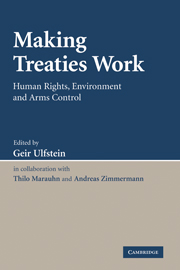Book contents
- Frontmatter
- Contents
- Preface and acknowledgments
- Notes on the contributors
- Table of cases
- Table of treaties and other international instruments
- INTRODUCTION
- PART I INTERNATIONAL HUMAN RIGHTS
- 1 Dispute resolution, compliance control and enforcement in human rights law
- 2 The International Covenant on Civil and Political Rights
- 3 The European Convention on Human Rights
- 4 The European Convention on the Prevention of Toture compared with the United Nations Convention Against Torture and its Optional Protocol
- PART II INTERNATIONAL ENVIRONMENTAL LAW
- PART III INTERNATIONAL ARMS CONTROL
- GENERAL COMMENTS
- Index
1 - Dispute resolution, compliance control and enforcement in human rights law
Published online by Cambridge University Press: 05 September 2009
- Frontmatter
- Contents
- Preface and acknowledgments
- Notes on the contributors
- Table of cases
- Table of treaties and other international instruments
- INTRODUCTION
- PART I INTERNATIONAL HUMAN RIGHTS
- 1 Dispute resolution, compliance control and enforcement in human rights law
- 2 The International Covenant on Civil and Political Rights
- 3 The European Convention on Human Rights
- 4 The European Convention on the Prevention of Toture compared with the United Nations Convention Against Torture and its Optional Protocol
- PART II INTERNATIONAL ENVIRONMENTAL LAW
- PART III INTERNATIONAL ARMS CONTROL
- GENERAL COMMENTS
- Index
Summary
General questions and introduction
International law has seen a vast and far-reaching development of human rights law, starting with the adoption of the Universal Declaration of Human Rights, to the entry into force of regional human rights conventions such as the European Convention on Human Rights, to the two Covenants on Civil and Political and on Social and Economic Rights and later specific subject-matter-oriented treaties such as the United Nations Convention Against Torture, the Convention on the Rights of the Child and finally the Convention on the Elimination of All Forms of Discrimination Against Women.
Yet, if one considers the daily reality of international life, one might wonder whether this development of substantive rules and the attempt to codify existing rules has led to an increased level of de facto protection of human rights. Thus the issue arises how the various treaties guaranteeing human rights by the same token also provide for mechanisms of dispute settlement, enforcement and compliance control.
This presentation will focus mainly on dispute resolution, enforcement and compliance control as contemplated by the various treaty regimes, in particular those treaty regimes which are not the subject of more specific case reports. In addition, some general remarks are also warranted relating not to treaty regimes, but to issues of general international law in the context of human rights protection, such as diplomatic protection and State responsibility.
- Type
- Chapter
- Information
- Making Treaties WorkHuman Rights, Environment and Arms Control, pp. 15 - 47Publisher: Cambridge University PressPrint publication year: 2007
- 1
- Cited by



